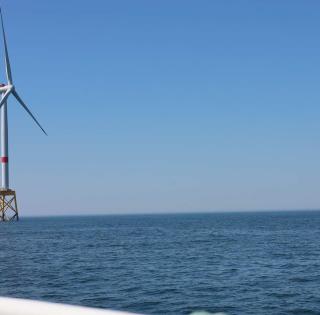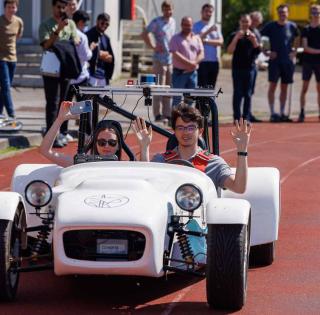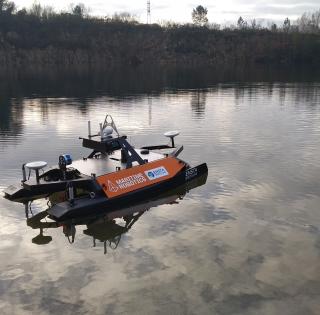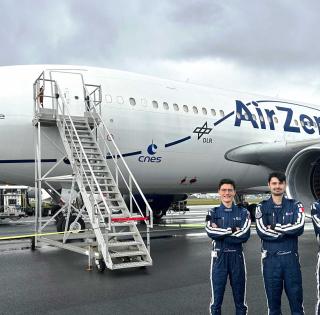
"As a member of the Avec les Femmes de la Défense group, and as a woman engineer, Amandine took part in the competition in the hope of motivating more women to become interested in engineering. She believes that women have a lot to contribute as engineers in the workplace, and are gaining ground in this type of career while also managing their personal and family lives. She told us about her career path since graduating from ENSTA Bretagne in 2006. "
What are the milestones in your career so far?
"There weren't any engineers or military personnel in my family, but I wanted to become a military engineer and to get involved in this very complex technical field, in which France has invested so much. I took preparatory classes in Nancy for two years, and then applied to ENSTA Bretagne in Brest where I studied to become a weapon system design engineer. In between the preparatory classes and ENSTA, I did a year of military training with the Air Force.
At ENSTA, I majored in electronics, IT and signal processing (now known as Observation Systems and AI) and went to work for Telecom Bretagne (now IMT Atlantique) in my third year. I did a Research Masters during my last year of engineering school, and majored in algorithmics and decision theory, which gave me an opportunity to study cognitive science as well as programming.
After graduating in 2006, I got a job in the human factors department at DGA Techniques Terrestres in Angers, where I worked in various fields such as decision-making autonomy, tanks, and robots. At the same time, I did a degree at medical school, focusing on physical ergonomics and the psychodynamics of work. Then, in 2008, I returned to Paris to work on drone programs, where I could apply my knowledge of human factors. Next, while working at DGA Ingénierie des Projets in Paris, I got involved in the "hard science" of robotics and partnered with various DGA centers of expertise on several drone contracts. "
Can you describe your role as a System Design Engineer? What qualities do you need to do this job?
"I manage technical coherence for a support information system in military planes and helicopters. In practical terms, I manage a team of fifteen people. We study the different technical designs available for the system, give our opinion on the offers for solutions we receive, and prepare future contracts. For this job, you need a good overall vision that focuses on strategy as well as on the overall coherence of all the elements. You have to be a good listener, but also be able to assert yourself to keep everyone on the same page; you have to be able to say when you agree and when you don't, and to say it at the right time. "
You make it sound easy to be a woman engineer today, whether in a corporation or at the DGA.
"In general, being a member of a minority can sometimes be difficult. People can sometimes be tactless, but it's really evolved.
I want to tell young women that they're up to the challenge: as women, as engineers, confident in their unique personality with its good qualities and its flaws."
I really believe in mentoring; not only among women to help them be more confident and ask the right questions, but also to help mentors recognize the issues within their organization. We shouldn't even be asking the question "Man or woman?" anymore. Everyone has a job to do. We should be seeking balance, including in our personal lives. Companies, and also the Ministry for the Armed Forces, are taking action towards gender equality. That's a good thing.
Women are really attracted to innovation. In 2014, I had my third child. While I was on maternity leave, I got involved in "Mumaround", a network that I started with a group of friends in Issy-les-Moulineaux. This network proves that lots of women (and mothers) are entrepreneurial, that they're self-employed and working in IT, and they're making a success of it. I think the key thing, for men or for women, is to want to get involved."
What has your education at ENSTA Bretagne in the Weapon System Design Engineer program brought to your career?
"When you participate in the Weapon System Design Engineer program, you're in the military and you make a commitment. The paid education program was also a factor for me at the time I decided to attend ENSTA. Looking back, I recognize what I gained from my education: during the year in the military I was able to work closely with system end users; advanced technical experience (I clearly remember my classes in signal processing and automation); and most of all a vision of the kind of future I wanted for myself. I had a highly technical education, but I also have an additional competence in human factors and cognitive science that I acquired from very competent teachers. I really enjoyed the exchanges we had with faculty, and the opportunity for each and every student to realize their potential.
Choosing to be a weapon system design engineer means choosing an outstanding career path. The year of military training that you undergo is a real plus, because you have the opportunity to work with and understand the professionals who are going to be using the tools you develop later on. After the first year of general engineering studies, you can branch out into very different fields: mechanics, pyrotechnics, signal processing, hydrography, or even aeronautics, if you add two years of study at ISAE-SUPAERO.
Every day, especially at the beginning of your career, you're testing technically complex material. For example, in Germany I once had to test autonomous robots weighing several tons on 15cm of snow. You evolve quickly, though; you change jobs at least every five years, which allows you to experience lots of different fields and take on more responsibility. You can then become a project or team manager, or even the manager of a technical center. Later in your career you can become a weapon system design engineer by passing an internal exam (there are two or three openings every year), like I did."










